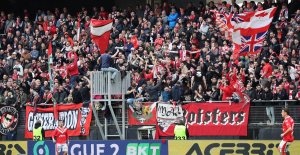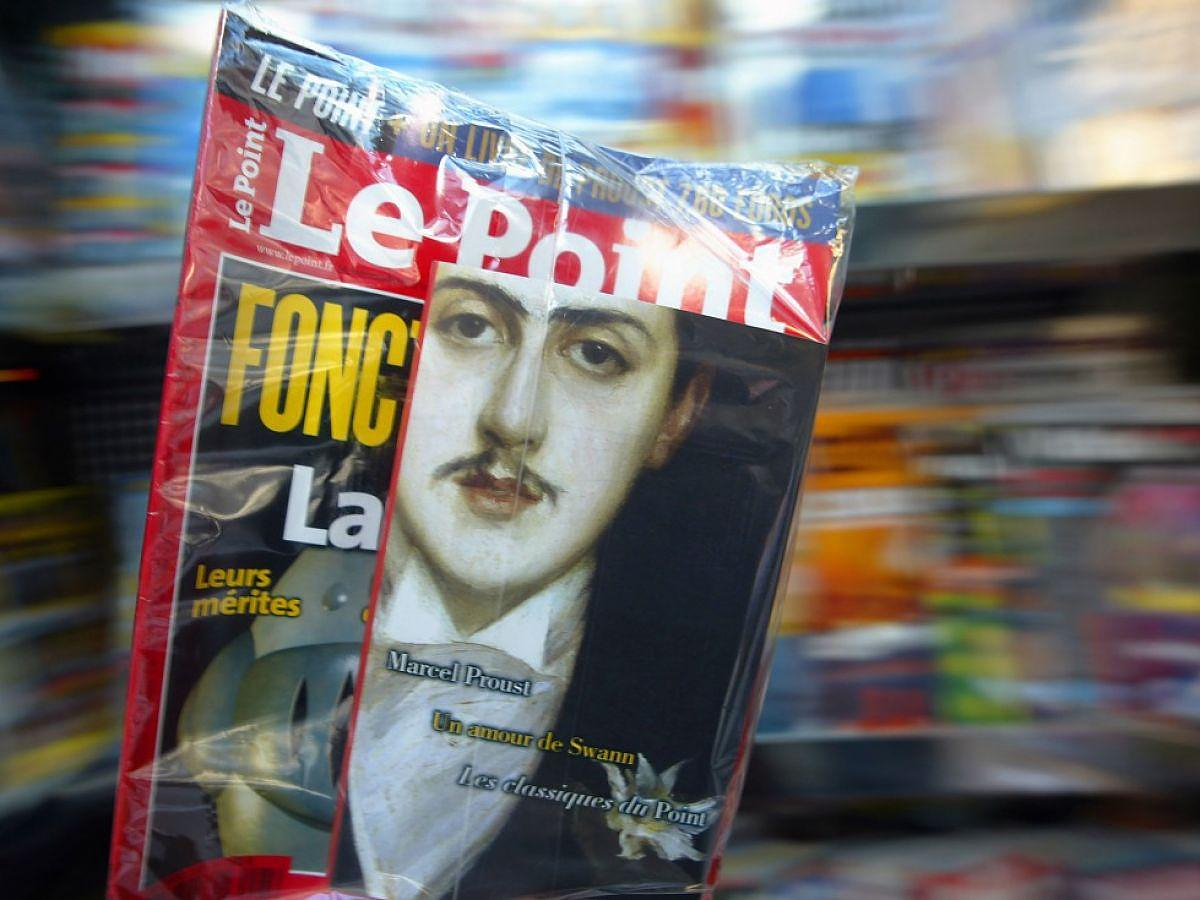The word "player" means actor in Yiddish, and "play" can mean a speech or a play. Names are important in Steven Spielberg's new film, which is about his own family. Here it is called Fabelman and derives from the German word "Fabel", a narrative form that mixes realistic and invented elements. One can read The Fabelmans as a key to Spielberg's work.
Young Steven in "Fabelmans" is called Sammy, father Burt (actually Arnold), mother Mitzi (actually Leah). The Fabelmans are a typical middle-class American family, settled in those suburbs with big front yards where the paperboy has to struggle to hurl the rolled newspaper to the front door. The father is a computer engineer, the mother would have liked to have become a pianist, but now takes care of the three daughters and the son.
Arnold and Mitzi Spielberg have little to do with films, they are orthodox Jews and try everything to keep their children from going to the cinema. Disney on TV, yes you can. The fact that they take their five-year-old son with them to his first cinema visit on January 10, 1952 (the date is correct!) has something to do with the film: Cecil B. DeMille's "The Greatest Show on Earth" is spectacular and morally unobjectionable.
Perhaps Steven Spielberg would never have felt the urge to go to the cinema if he had been used to the big screen beforehand. But on January 10, the huge spectacle caught him unprepared: the circus arena, daring trapeze artists, the elephants - and an accident in which two trains collided!
Now Steven's home (and Sammy's in the film) had a toy train set. And the father owned an eight-millimeter camera for family movies, and the mother liked to tell the story that baby Steve grabbed the lens as soon as it was first pointed at him. The son criticized his father's shaky shots for so long that he handed him the camera with the words: "You are now the family photographer!"
The film dispenses with this anecdote, but gives a true account of how Sammy now begins to reenact the train wreck from the DeMille film in the attic. His first film, which he made when he was eleven, was called The Last Train Wreck. There will be a circus train in Indiana Jones and the Last Crusade, a train wreck in Super 8, an alleged train wreck in Close Encounters of the Third Kind, and a toy train suddenly comes to life in E.T.
The Spielbergs moved twice during Steven's youth, from New Jersey to Arizona and to California, always following their father's jobs. Arnold Spielberg is rarely present, and if you're looking for one constant in Spielberg films, it's the absent father. Little Drew Barrymore's father in "E.T." - non-existent. Richard Dreyfuss in the "Close Encounter" - gets infected by the UFO hysteria and leaves his family. Sean Connery in the third Indiana Jones - estranged from son. And in the fourth, Harrison Ford suddenly discovers that Shia LaBeouf is his son.
The list could go on, but perhaps it has come to an end with The Fabelmans. After all, Spielberg owes one of his great passions to his father. "I remember him waking me up one night and taking me up a hill at about 3 a.m.," Spielberg recalled one starry night in Arizona. "He spread a blanket and we watched an amazing swarm of shooting stars... I've had my head in the clouds ever since... I was star obsessed and still am."
In the film, this father, this Burt Fabelman, is a sympathetic character. It is he who buys Sammy his first editing table so he can put together a big family film from the many snippets to cheer up Mitzi, who has sunk into depression after the death of her mother.
This is one of Tony Kushner's screenplay's most beautiful moments, as he combines the discovery of a family secret with the discovery of a fundamental mechanism of cinema. So Sammy starts splicing scenes together, giving them meaning. It's just going to be very different from what he expected. The fact is that he suspiciously finds many scenes in which mother Mitzi and cousin Bennie separate themselves and exchange intimate looks. The technique of film editing brings it to light: there is an affair going on.
A deeply personal dilemma, a comic-tragic situation. Not a typical Spielberg scene. For a long time he filmed adventures for big boys, not family dramas. He got his experiences from the cinema, not from real life. "I've never been robbed," he said of his youth, "never been involved in any fights. I've never seen a dead person."
The films he started making when he was twelve and with the help of school friends were the films he would have liked to see but his parents wouldn't let him see, ranging from westerns to war movies to the alien invasion. They were called "Battle Squad" and "Escape to Nowhere" and "Firelight"; The latter was 140 minutes long and cost $500, and the father rented a cinema in Scottsdale for it, where the film was shown in a single evening - and brought in $600. It was a 16-year-old's blockbuster debut and an underdog's triumph: spindly Spielberg had no interest in sports, cars, or girls, just the camera.
In the "Fabelmans" you see the "shooting" of one of those war films, something with Rommel in North Africa, the mother made cherry jelly for these occasions, which was splattered as blood, and the school friends crowded around for rolls of film. By the time Spielberg entered college at 17, he'd already done a good dozen of these originals.
But nobody in Hollywood wanted to look at these business cards, they were on eight-millimeter film, which only amateurs used. And so the legend of Spielberg's beginnings began. It works like this: After a tourist tour of Universal Studios, he got a three-day pass, on the fourth he was simply waved through, looked for an empty office on the site, had his name entered in the telephone directory and the hanging around at shoots and in editing rooms for the next few months.
"The Fabelmans" leaves open how much of this is true, but serves up a fabulous episode. Somehow the young Spielberg managed to get an audience with the western pope John Ford. There he sits enthroned behind the desk, complete with the famous eye patch, and looks so similar to the original Ford that at first you don't even notice who's playing him: none other than David Lynch. When asked for advice, Ford points to photos on the wall: "Look at that horizon! You can always film the horizon deep down in the picture, or at the very top, never in the middle. And now out!”
It's a wonderful scene, a passing of the baton from a weathered legend to a rising one - but one that probably never happened. The truth is sadder. One of Spielberg's other great role models was Alfred Hitchcock. 1975 - Spielberg's Jaws was in theaters and Hitch was filming his final film, Family Grab - Spielberg sneaked onto the set and sat behind Hitchcock in the dark. He waved to his assistant and told the silent visitor, "Mr. Hitchcock is unnerved by your presence. Would you please leave the studio?”
Hitchcock was 76 then. Spielberg is 76 today. It took him a long time before he started this family film. His parents, his sisters always pushed him. Leah Spielberg died six years ago at the age of 97, Arnold Spielberg died in 2020 at the age of 103. Steven Spielberg began writing the book on The Fabelmans six weeks after his death.

 His body naturally produces alcohol, he is acquitted after a drunk driving conviction
His body naturally produces alcohol, he is acquitted after a drunk driving conviction Who is David Pecker, the first key witness in Donald Trump's trial?
Who is David Pecker, the first key witness in Donald Trump's trial? What does the law on the expulsion of migrants to Rwanda adopted by the British Parliament contain?
What does the law on the expulsion of migrants to Rwanda adopted by the British Parliament contain? The shadow of Chinese espionage hangs over Westminster
The shadow of Chinese espionage hangs over Westminster What High Blood Pressure Does to Your Body (And Why It Should Be Treated)
What High Blood Pressure Does to Your Body (And Why It Should Be Treated) Vaccination in France has progressed in 2023, rejoices Public Health France
Vaccination in France has progressed in 2023, rejoices Public Health France Food additives suspected of promoting cardiovascular diseases
Food additives suspected of promoting cardiovascular diseases “Even morphine doesn’t work”: Léane, 17, victim of the adverse effects of an antibiotic
“Even morphine doesn’t work”: Léane, 17, victim of the adverse effects of an antibiotic Collection of booklet A stalls in March
Collection of booklet A stalls in March Kering expects a 40 to 45% drop in operating profit in the first half
Kering expects a 40 to 45% drop in operating profit in the first half Smartphones, televisions, household appliances… MEPs adopt a “right to repair”
Smartphones, televisions, household appliances… MEPs adopt a “right to repair” Fintechs increasingly focused on business services
Fintechs increasingly focused on business services The standoff between the organizers of Vieilles Charrues and the elected officials of Carhaix threatens the festival
The standoff between the organizers of Vieilles Charrues and the elected officials of Carhaix threatens the festival Strasbourg inaugurates a year of celebrations and debates as World Book Capital
Strasbourg inaugurates a year of celebrations and debates as World Book Capital Kendji Girac is “out of the woods” after his gunshot wound to the chest
Kendji Girac is “out of the woods” after his gunshot wound to the chest The Court of Auditors scrutinizes the management and projects of the Center Pompidou
The Court of Auditors scrutinizes the management and projects of the Center Pompidou Skoda Kodiaq 2024: a 'beast' plug-in hybrid SUV
Skoda Kodiaq 2024: a 'beast' plug-in hybrid SUV Tesla launches a new Model Y with 600 km of autonomy at a "more accessible price"
Tesla launches a new Model Y with 600 km of autonomy at a "more accessible price" The 10 best-selling cars in March 2024 in Spain: sales fall due to Easter
The 10 best-selling cars in March 2024 in Spain: sales fall due to Easter A private jet company buys more than 100 flying cars
A private jet company buys more than 100 flying cars This is how housing prices have changed in Spain in the last decade
This is how housing prices have changed in Spain in the last decade The home mortgage firm drops 10% in January and interest soars to 3.46%
The home mortgage firm drops 10% in January and interest soars to 3.46% The jewel of the Rocío de Nagüeles urbanization: a dream villa in Marbella
The jewel of the Rocío de Nagüeles urbanization: a dream villa in Marbella Rental prices grow by 7.3% in February: where does it go up and where does it go down?
Rental prices grow by 7.3% in February: where does it go up and where does it go down? Europeans: “All those who claim that we don’t need Europe are liars”, criticizes Bayrou
Europeans: “All those who claim that we don’t need Europe are liars”, criticizes Bayrou With the promise of a “real burst of authority”, Gabriel Attal provokes the ire of the opposition
With the promise of a “real burst of authority”, Gabriel Attal provokes the ire of the opposition Europeans: the schedule of debates to follow between now and June 9
Europeans: the schedule of debates to follow between now and June 9 Europeans: “In France, there is a left and there is a right,” assures Bellamy
Europeans: “In France, there is a left and there is a right,” assures Bellamy These French cities that will boycott the World Cup in Qatar
These French cities that will boycott the World Cup in Qatar Football: VAFC supporters are ironic after their descent into National
Football: VAFC supporters are ironic after their descent into National Tennis: Carlos Alcaraz should play in Madrid
Tennis: Carlos Alcaraz should play in Madrid Football: victim of discomfort in the middle of a match in mid-April, Evan Ndicka will resume training with AS Roma
Football: victim of discomfort in the middle of a match in mid-April, Evan Ndicka will resume training with AS Roma Ligue 1: PSG almost champion, OM, shock for the C1… 5 reasons to follow an exciting evening
Ligue 1: PSG almost champion, OM, shock for the C1… 5 reasons to follow an exciting evening


















